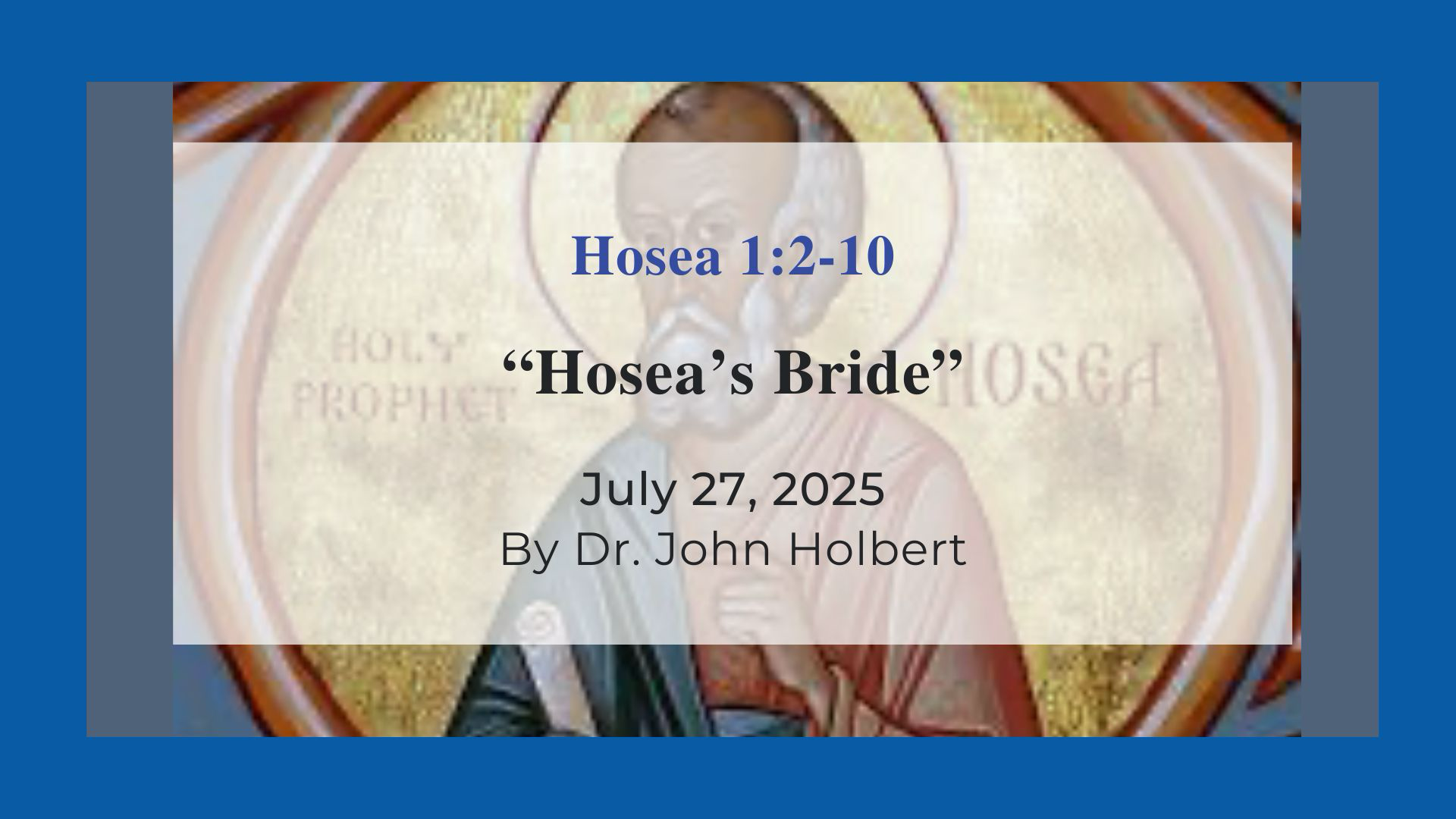Hosea's Bride - Reflections on Hosea 1:2-10, Pentecost 7, Year C
by John C. Holbert on Friday, May 16, 2025

Perhaps the most famous, and surely the most infamous, marriage in the Hebrew Bible is that match between the 8th-century BCE prophet Hosea and his chosen spouse, Gomer. “YHWH said to Hosea, ‘Go! Take for yourself a whore, (who will have) children of whoredom, because Israel has played the whore by abandoning YHWH’” (Hosea 1:2). This shocking and deeply offensive beginning of a prophetic book has caused no end of debate and profound distress, especially among women readers. Did Hosea actually do this thing? Did he allow his entire life as Gomer’s husband to be merely a metaphor for YHWH’s fury against an Israel that had left the worship of their God for the lures of foreign deities, and thereby had become little more than devotees of idols and the unjust and deviant practices that follow from such behavior? Or is the entire narrative itself simply a metaphor for Israel’s rejection of YHWH and all that YHWH had stood for? I admit that I used to believe the former, namely that the prophet actually did marry a woman of ill-repute, but now I am not so certain. The entire scenario of Hosea 1 strains credulity, though the action would hardly be the first or only prophetic behavior that is nothing less than bizarre—anyone who has read the prophet Ezekiel is well aware of that!
Still, the marriage metaphor, if indeed it is only that, makes the central point very clear—YHWH is enraged at the chosen people who have left YHWH behind in their search for other deities who better match their lascivious and lurid desires. Without doubt, the text of Hosea is rife with sexual imagery, perhaps somewhat disguised by the poor state of the Hebrew text of the book. Outside of the book of Job, Hosea may be the most difficult Hebrew to translate in the entire Bible. I have often wondered if that poor preservation of the text of the book does not result from the shocking nature of a good deal of what is actually said! Whether or not that supposition contains any truth, the tale of Hosea’s life is filled with a strange and painful series of events.
Not only does he marry Gomer, the apparent prositute, but she soon becomes pregnant (by Hosea or another?) and bears a son whom he is to name Jezreel (Hosea 1:4a). The boy is a living symbol of YHWH’s desire to punish the house of King Jehu for its horrifying depredations during his bloody reign over Israel. Jehu led a coup against Joram, Ahab’s son at the instigation of the prophet Elisha. Jehu murdered Joram outside of the city of Jezreel, and tossed his corpse onto the former vineyard of Naboth, whom Ahab had stolen from him after Jezebel, Ahab’s wife, had conspired to kill Naboth. In turn, Jezebel was also murdered by Jehu, who had her thrown from a second-story window in order that he might run over her with his chariot. As can readily be seen, the memory of Jezreel is vivid and disgusting, and Hosea’s first child will be a constant reminder of it. YHWH promises to “put an end to the kingdom of the house of Israel,” because of these horrors.
Gomer is soon again pregnant, and this time births a daughter, who will be named Lo-ruchamah,“not pitied” in Hebrew, though the word ruchamah is more literally the word for womb. With a certain genius, the Hebrews designated that word to mean “compassion” or “pity,” reckoning that no compassion could surpass that of a woman for her unborn child. But to name a child “not pitied,” “not filled with compassion” is to announce that YHWH has now rejected Israel, and because of its constant sinning, will no more care for it. The first part of vs.7, an announcement of “pity on the house of Judah” has long been thought to be an addition by a Judean editor of the text who wished to say that YHWH would still care for Judah, the southern kingdom, even though the northern kingdom of Israel was doomed. Given the dark nature of the surrounding text, that notion carries a good bit of weight.
After weaning lo-ruchamah, Gomer bears another son, now monstrously named Lo-ammi, “not my people,” for “you are not my people and I am not your God,” says YHWH, completely reversing the most basic claims of Israel and YHWH. There is thus a terrible movement, symbolized by Hosea’s three children. First, Jezreel is named for an historical event that causes YHWH great fury and one that needs restitution. Then, not only does YHWH seek to right the vast wrongs surrounding Jezreel, but then says that YHWH has no more pity or compassion for the chosen ones—lo-ruchamah, says YHWH. The final blow is the utter separation of YHWH from the people of Israel—no longer are you my people at all! Hosea’s very family is a stark announcement that Israel has forsaken its God, and now that God has forsaken Israel.
The lectionary includes vs.10 in its reading, but in Hebrew there is no Hosea 1:10; in Hebrew Hosea 1:10 is in fact Hosea 2:1. It seems plain that the upbeat message of Hosea 2:1 is quite separate from the dark word of chapter 1. Still, as we will see in next week’s text, Hosea does not end his prophetic word with doom and gloom, but provides one of the most uplifting passages in all the scripture. But before that good word, we must reckon with YHWH’s rage against the people, made all too real by the strange marriage and subsequent children of the prophet. Whether that marriage was actually historical or only a metaphorical legend, its memory remains vivid and profound all these 2700 years since its composition.
